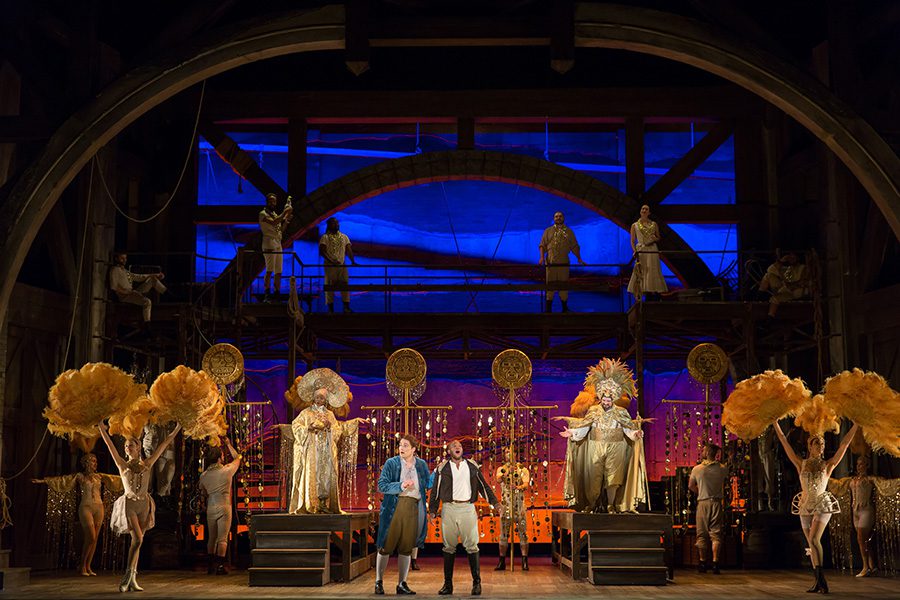Bernstein’s ‘Candide’ Is a Glorious Mess
By • May 7, 2018 0 1519

When “Candide,” a collaborative product of composer Leonard Bernstein and playwright and memoirist Lillian Hellman, based on a thin fable-novel by Voltaire, the Enlightenment’s superstar philosopher-wit, opened in Broadway’s Martin Beck Theatre (now the Al Hirschfeld Theatre) in 1956, it was a bust.
The production had the participation of such luminaries as performers Barbara Cook and Robert Rounseville, director Tyrone Guthrie and choreographer Anna Sokolow. Nonetheless, the show failed with the critics (for the most part) and the public, coming to a halt after 73 performances.
Ever since, however, thanks in part to a life-saving recorded version, “Candide” has become practically a staple of American and international theater. After a number of previous revivals and revisions — many by Bernstein himself — it returned to Broadway in 1974 with a new book by Hugh Wheeler.
This version was a major success, running for nearly two years and 740 performances. The genre-defying “Candide” — at turns defined as an American opera, an operetta and a musical — is now, as part of the Bernstein centennial, in the Kennedy Center Opera House through May 26, alternating with Rossini’s comic opera “The Barber of Seville” (closing May 19).
This “Candide,” directed energetically and with respectful affection by Washington National Opera Artistic Director Francesca Zambello, at first glance, seems something of a mess.
By mess, I mean a glorious mess of style, intention and invention. That’s precisely because it is indeed an opera in most ways, what with a wonderfully diverse score, including the much-admired overture and the sometimes excruciatingly torturous (for sopranos) and rewarding (for the audience) “Glitter and Be Gay.”
It has more than enough of a comedic, even silly, attitude and the kinds of improbabilities found in operettas, as well as the story, sense of drama and compositional tics found in American musicals. Plus, it has the diverse musical genius of Bernstein, who gave us “Mass,” “Trouble in Tahiti” and “West Side Story.”
The book and lyrics have at various times included the fingerprints of Hellman, Wheeler, poet Richard Wilbur, Dorothy Parker and Stephen Sondheim, among others.
This tends to sometimes result in a confusion and profusion of temperament and tempo. The second act seems to be heavy on narrative and, midway through, a little light on musicality, a fault corrected triumphantly at the end.
What this production achieves is nonetheless nearly miraculous. The plot — convoluted and serpentine though it is, with numerous changes of course, scene, pace and tone, and replete with enough cynicism and cruel humor to make the current pope blush — remains funny, touching, a giant if dark adventure.
More improbably, it not only challenges the audience to think in modern, nuanced terms, it also lays out a marginal sliver and slice of hope, in spite of the often horrible emotional and physical disasters incurred by its characters.
Candide, himself, the bastard child of a landed count in Protestant Westphalia, involved in the unimaginably brutal religious wars of the time with neighboring and Catholic Bavaria, gets the worst of it.
A handsome, remarkably innocent youth, Candide means to weds his beloved Cunegonde, the baron’s daughter. This gets him kicked out of town, not the last of his woes. He’s conscripted by the Bavarians and hears that his true love and her family have been murdered.
Actually, it turns out she survived, and has landed in Portugal as mistress to not one but two powerful men, including the head of the Inquisition.
Their misfortunes continue across the globe, accompanied by their tutor, a woman known only as the Old Lady, who espouses the idea that evil and disaster are just another part of this “best of all possible worlds.
Their narrative, which includes a journey to the South American New World, is a dark encounter of the picaresque sort, but the music, while in tune with the context, is sublime. The score includes “The Best of All Possible Worlds,” “I Am Easily Assimilated” — sung with lusty ease by the Old Lady, portrayed with edge and hearty humor by mezzo-soprano Denyce Graves — and the bitterly chaotic and comic “What a Day for an Auto Da Fe,” which is borderline Mel Brooks material.
The cast does wonders with all this, especially soprano Emily Pogorelc, who handles the tasking “Glitter and Be Gay” triumphantly.
Tenor Alek Shrader is impressively consistent in his singing and acting as Candide. He rises out of the bitter ashes of the part, vocally expressing in the solemnly beautiful “Make Our Garden Grow” a plea to accept the small triumphs of the ordinary in daily life.
In the end, this production becomes kind of act of faith and love, musically rewarding and moving, and challenging, funny and jarring in its narrative.

